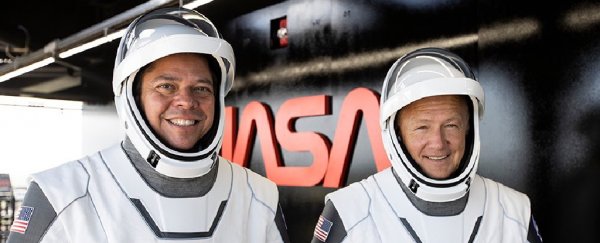SpaceX just achieved an historic feat that even its CEO, Elon Musk, thought improbable when he founded the rocket company in 2002: flying people to and from space.
On Sunday afternoon, NASA astronauts Bob Behnken and Doug Hurley safely careened back to Earth after a 27-million-mile mission in orbit around the planet. The men rode SpaceX's new Crew Dragon spaceship, landing its cone-shaped capsule around 2:48 p.m. ET in the Gulf of Mexico near Pensacola, Florida.
"Thanks for flying @SpaceX."
— NASA (@NASA) August 2, 2020
📍 Current Location: Planet Earth
A 2:48pm ET, @AstroBehnken and @Astro_Doug splashed down, marking the first splashdown of an American crew spacecraft in 45 years. #LaunchAmerica pic.twitter.com/zO3KlNwxU3
Ahead of the landing, the crew undocked from the $US150 billion International Space Station, where they'd spent 63 days, and performed a series of manoeuvres to return home to their families. The capsule handily survived a blistering 3,500-degree-Fahrenheit (1,926 C°) return through Earth's atmosphere, a high-stakes parachute deployment, and the final splashdown.
Congratulations @SpaceX & @NASA on completing first crewed Dragon flight!! 🇺🇸 returned.
— Elon Musk (@elonmusk) August 2, 2020
SpaceX privately designed, built, and operated the vehicle with about $US2.7 billion in contracts from NASA's Commercial Crew Program. The money helped SpaceX create its newfound spaceflight capability and is funding about half a dozen missions – including Behnken and Hurley's demonstration flight, Demo-2, which launched on May 30.
With Demo-2's completion, SpaceX has put an end to a nine-year drought of crewed spaceflight from US soil. The company has also resurrected NASA's ability to reach the ISS, where the agency hopes to ramp up work to help it return humans to the moon and eventually reach Mars.
"To anybody who has touched Endeavour, you should take a moment to just cherish this day."
— NASA (@NASA) August 2, 2020
Touching words from @Astro_Doug as @AstroBehnken is safely brought out of the spacecraft. #LaunchAmerica pic.twitter.com/0yKUWbD9Ed
The mission's end likely brings SpaceX just weeks from a NASA certification of its Crew Dragon for regular flights of astronauts – and private citizens.
"We don't want to purchase, own, and operate the hardware the way we used to. We want to be one customer of many customers in a very robust commercial marketplace in low-Earth orbit," Jim Bridenstine, NASA's administrator, said during a NASA TV broadcast ahead of the landing.
Applause is heard from the @SpaceX teams as @Astro_Doug has joins @AstroBehnken safely out of the Dragon Endeavour spacecraft. #LaunchAmerica pic.twitter.com/3aBzXbAzuG
— NASA (@NASA) August 2, 2020
He added: "This is the next era in human spaceflight, where NASA gets to be the customer. We want to be a strong customer, we want to be a great partner. But we don't want to be the only ones that are operating with humans in space."
👀 The first view of the @SpaceX Dragon Endeavour vehicle returning to Earth. #LaunchAmerica pic.twitter.com/zVxi1DgrSe
— NASA (@NASA) August 2, 2020
'I doubted us, too'
During a briefing following the launch of Demo-2, Business Insider asked Musk if he had a message for those who ever doubted him or the company.
Scorch marks are seen on the outside of the @SpaceX Dragon Endeavour as we prepare to open the hatch. #LaunchAmerica pic.twitter.com/dTu8blQkHK
— NASA (@NASA) August 2, 2020
"To be totally frank, I doubted us, too. I thought we had maybe – when starting SpaceX – maybe had a 10 percent chance of reaching orbit. So to those who doubted us I was like, 'Well, I think you're probably right,'" Musk said.
He added: "It took us took us four attempts just to get to orbit with Falcon 1 … People told me this joke: How do you make a small fortune in the rocket industry? 'You start with a large one' is the punch line."
Musk said SpaceX "just barely made it there," adding, "So hey, I think those doubters were – their probability assessment was correct. But fortunately, fate has smiled upon us and brought us to this day."
This article was originally published by Business Insider.
More from Business Insider:
